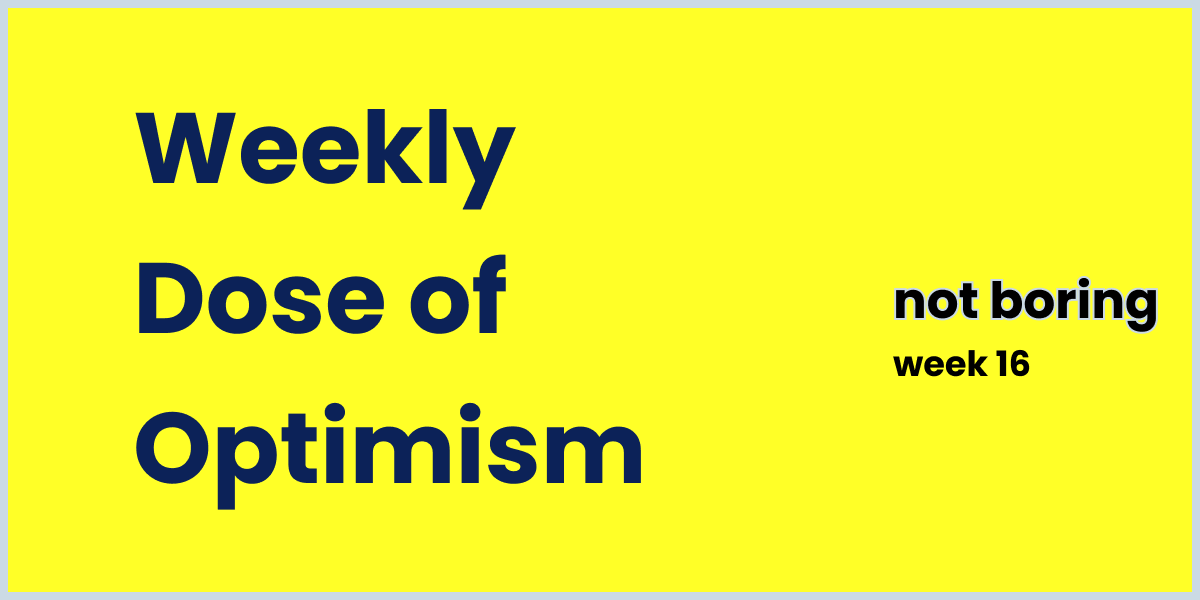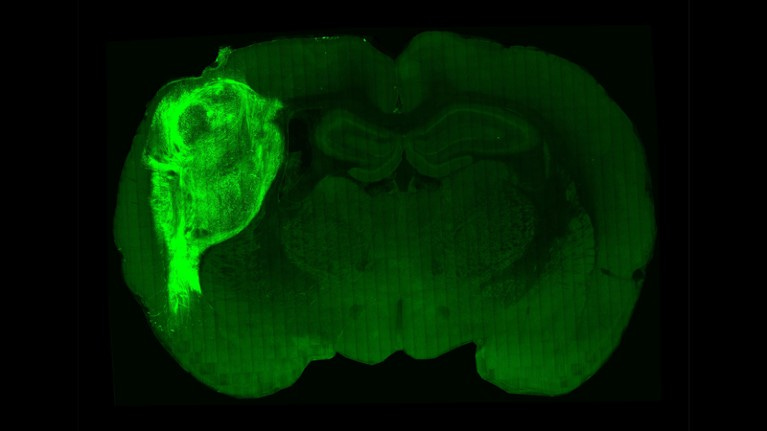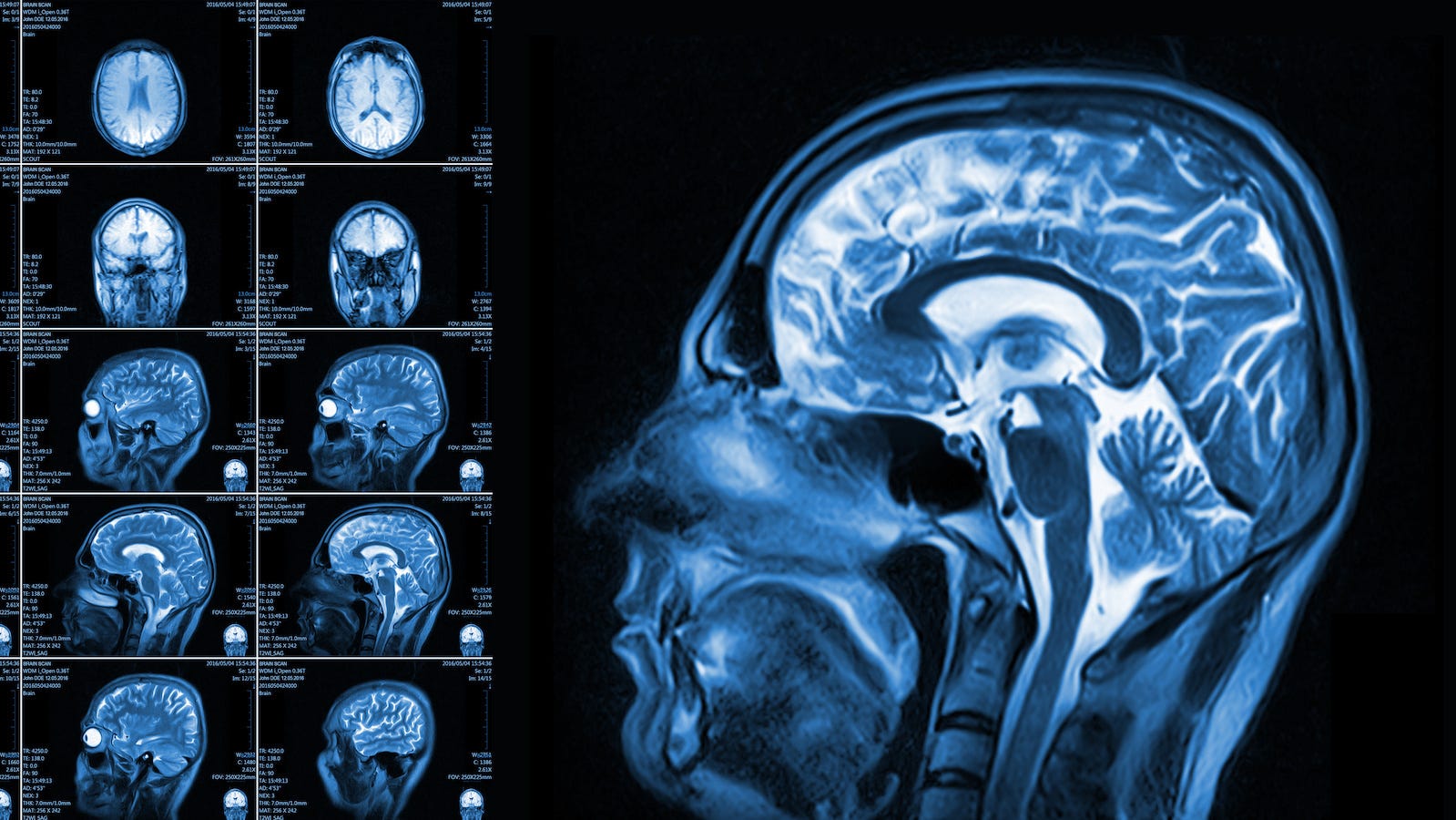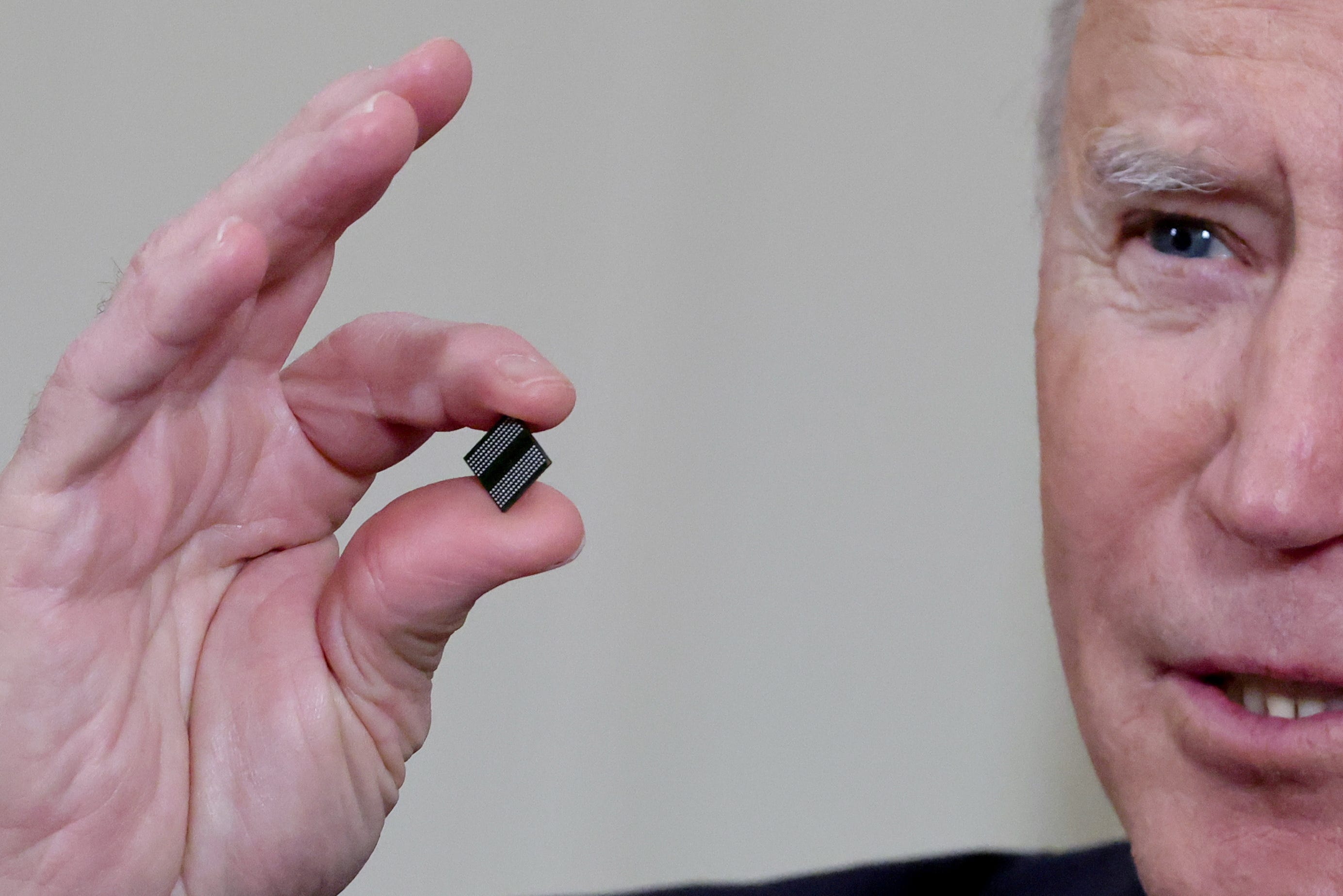Not Boring by Packy McCormick - Weekly Dose of Optimism #16
Weekly Dose of Optimism #16The Great and Powerful Podcast AI, Rat Humanoids, Thinking about Thinking, Not So Quiet on the Chips Front, Genius GrantsCome for the Optimism, stay for the in-depth analyses of tech companies and trends: Hi friends 👋, Happy Friday and welcome to our 16th Weekly Dose of Optimism. We kicked off the weekend last night by hosting a NYC Tech Week happy hour, in partnership with Not Boring Capital portfolio company Bridgesplit. After meeting so many founders and folks in the NYC tech space, it’s hard to not have a bit of optimism in our step this morning. Let’s get to it. (1) podcast.ai
Another day, another mind-blowing AI project hitting the internet. This time it was a 20 minute deepfake podcast conversation between Joe Rogan and Steve Jobs. The podcast was created by the team from Play.ht, a text-to-voice generator, which used thousands of hours of the Joe Rogan Experience audio and publicly available internet videos of Jobs to create a relatively realistic (and very listenable) conversation between the two. As someone who has listened to more JRE than I’d like to admit, this blew me away: the tone of voice, speech cadence, and even style of joke were pretty much spot on. The AI models behind the podcast are based on similar concepts to DALL-E and GPT models, and allow the language generator to imitate human’s tones and emotions. The team plans on dropping a new deepfake podcast every week with new guests — both dead and alive. This is as Black Mirror-ish as any of the AI content generators to-date and about as close to bringing back someone from the dead as we’ve ever seen. Please keep us professional content creators in your thoughts and prayers during these trying times. (2) Human ‘mini-brains’ implanted in rats prompt excitement — and concern Sara Reardon for Nature
This is one of those scientific breakthroughs that seem really interesting, but so far away impacting our actual lives that it’s hard to care about. Cool, we transplanted human brain cells into a rat’s brain, where the human cells continued to grow and integrate with the rat’s brain. Rat stuff happens all the time in labs. Very impressive, but not exactly changing my life in the next couple of years. But this could be one of the more groundbreaking (or at least thought provoking) developments in brain science ever — the researchers basically just a) created a new humanoid and b) depending on your ethical standards, created a new species on which highly relevant brain experiments can be carried out. How much of a rat’s brain can consist of human cells before it becomes a human brain? Would we be willing to perform experimental research on a living human brain, if that human brain was previously enclosed within a rat’s skull? We’re likely far off from needing to confront these exact questions — “Last year, a panel organized by the US National Academies of Sciences, Engineering, and Medicine released a report concluding that human brain organoids are still too primitive to become conscious, attain human-like intelligence or acquire other abilities that might require legal regulation” — but this discovery will, in the short-term, likely advance more incremental but important research on how the human brain functions. (3) London, U.S. scientists suggest cognition far more than neuron processing in the brain Marjorie Hecht for Current Science Daily
While you’re off philosophizing about rat-bodied humanoids, a group of scientists are calling into question the very nature of “thinking.” Traditionally, cognition is thought to be the domain of the brain. But research (or at least interpretations of research) suggests that the brain’s processes for thinking are actually much more flexible and interconnected with other systems in the body, like the immune system. Essentially, the mind and the body may be more interconnected — even at the cellular level — than previously suspected. (4) US Chip Sanctions ‘Kneecap’ China’s Tech Industry Will Knight for Wired
We’ve written much about the New Cold War at Not Boring and the battlefields on which the war will be fought. The U.S. is starting to take clear and deliberate actions on a one very important front: semiconductors. If the New Cold War will be fought using AI, drones, and other advanced technologies, then semiconductors will power that war. The first move was to start the reshoring of semiconductor fabrication, with the government pouring billions of dollars of investment and incentivizes to get both U.S. and foreign companies alike to manufacture chips in the U.S. The second move is to restrict the flow of chips (and the technologies needed to make them) into China. The U.S. has long led the way in the research and IP in semiconductor innovation, but China has become an increasingly large producer in recent years and, of course, has a level of geographic influence over the world’s top three producers (Japan, South Korea, and Taiwan). Biden’s playbook seems to be:
This strategy, at least in theory, should make the U.S. a less fragile chip player and China a much weaker chip player. Not Boring is not a policy blog — but we do think that in a New Cold War between the U.S. and China, that the U.S., and its allies, prevailing is a good thing. Democracy is better than Communism. We’ll go on record saying as much. This policy change is strong move from the Biden Administration: the U.S. is not only reducing its reliance on China, but also restricting access to one of the New Cold War’s most valuable weapons.
Last week we wrote about the Nobel Prize winners. Previously, we’ve written about the Breakthrough Prize. At Not Boring, we celebrate the institutions that celebrate the best among us. The MacArthur Foundation is one such institution. Unlike the two other prizes mentioned above, the MacArthur Fellows program — also known as the Genius Grant — doesn’t reward recipients for any specific breakthrough or past achievement. Rather, the program recognizes the potential — the genius — that lives inside a select group of creative professionals, and grants them the financial freedom to unleash that genius full throttle. It’s almost like VC, but for creative individuals rather than companies. This year’s 25 recipients include an artist, an astrodynamicist, a synthetic inorganic chemist, and a sociologist/criminologist/social worker, pointing to the myriad forms and expressions of genius. Among them is June Huh, the high school drop out poetic mathematician who we covered when he won the Fields Medal earlier this year. Big year for June. The program has had a few big bets pay off in the past including, famously, Lin-Manuel Miranda. Had that been an investment rather than a grant, it would have been a lucrative one: the genius grant allowed Miranda the time and resources to work on Hamilton, which has become a billion dollar franchise. That’s all for this week. If you enjoyed this week’s email, please share it with a friend or two! We’ll be back in your inbox 9am EST on Monday morning. Enjoy the weekend. Packy 1 https://www.nature.com/articles/d41586-022-03238-x#ref-CR1 If you liked this post from Not Boring by Packy McCormick, why not share it? |
Older messages
Social vs. Science Experiments
Monday, October 10, 2022
Or, why progress curves in AI and web3 look different
Weekly Dose of Optimism #15
Friday, October 7, 2022
Democratizing AI, Nobel Prizes, Eradicating Malaria, Ice Bucket Challenge, and Green Hydrogen
How Do I Teach These Kids?!
Monday, October 3, 2022
Thoughts on educating my kids in a fast-changing world
Weekly Dose of Optimism #14
Friday, September 30, 2022
Progress and Optimism, Marathon World Records, Mammal Comebacks, DART, a Nuclear Enchanted Notebook, and The World's Fair Co.
Tegus: The Outsiders
Thursday, September 29, 2022
Meet the under-the-radar $3 billion company modernizing investment research
You Might Also Like
+34% more leads (study)
Friday, February 28, 2025
I love that you're part of my network. Let's make 2025 epic!! I appreciate you :) Today's hack +34% more leads (study) Diego Chacon decided to test what specific format of the same offer (
🔍 Why Brands Need To Launch A Social Show
Friday, February 28, 2025
February 27, 2025 | Read Online All Case Studies 🔍 Learn About Sponsorships Social is becoming the new TV. From our consumption habits to the content types - every day we progress to a landscape where
High-traffic sites less than a year old
Friday, February 28, 2025
These numbers are wild
Help me help you!
Thursday, February 27, 2025
Your opinion means everything hey-Jul-17-2024-03-58-50-7396-PM Can you believe Masters in Marketing is already 8 months old? Aw, so cute! And, like any anxious new parents, we want to know how we'
Discover a preview of the content keeping Digiday+ members ahead
Thursday, February 27, 2025
Digiday+ members have more ways than ever to stay ahead of the news and trends transforming media and marketing. Explore premium content from our editors below, including weekly briefings, research and
See you in Boston?
Thursday, February 27, 2025
...back in person for the first time since 2019! Exploding Topics Logo Presented by: Semrush Logo You follow Exploding Topics because you want to get an edge on your competition. Now take that
Why I'm doubling down on my community in 2025... (free bonus)
Thursday, February 27, 2025
Hi there 2025 is chugging along (it's almost March!) – and there's a ton going on right now. But there's something that hasn't changed. Your agency still needs a constant stream of new
Programmer Weekly - Issue 243
Thursday, February 27, 2025
February 27, 2025 | Read Online Programmer Weekly (Issue 243 February 27 2025) Welcome to issue 243 of Programmer Weekly. Let's get straight to the links this week. Streamline IT management with
🎙️ New Episode of The Dime China Tariffs & The Next Era of Vapes: Impact on Supply Chains & Brands ft. Nick Kovacevich
Thursday, February 27, 2025
Want to be featured on The Dime Podcast? Scroll to the end of this email to find out how. Listen here 🎙️ China Tariffs & The Next Era of Vapes: Impact on Supply Chains & Brands ft. Nick
80% less time on social reporting sound good?
Thursday, February 27, 2025
Get Forrester's Total Economic Impact™ of Sprout. ͏ ͏ ͏ ͏ ͏ ͏ ͏ ͏ ͏ ͏ ͏ ͏ ͏ ͏ ͏ ͏ ͏ ͏ ͏ ͏ ͏ ͏ ͏ ͏ ͏ ͏ ͏ ͏ ͏ ͏ ͏ ͏ ͏ ͏ ͏ ͏ ͏ ͏ ͏ ͏ ͏ ͏ ͏ ͏ ͏ ͏ ͏ ͏ ͏ ͏ ͏ ͏ ͏ ͏ ͏ ͏ ͏ ͏ ͏ ͏ ͏ ͏ ͏ ͏ ͏ ͏ ͏ ͏ ͏ ͏ ͏ ͏ ͏ ͏




